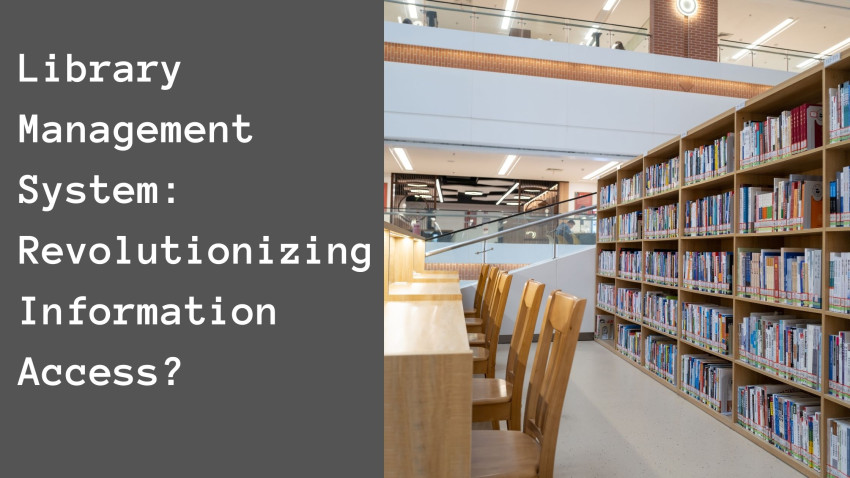
In the modern era, libraries serve as hubs of knowledge dissemination and academic support within educational institutions and communities. The advent of technology has revolutionized the way libraries operate, with Library Management Systems emerging as indispensable tools for efficiently organizing, cataloging, and providing access to vast collections of resources. This comprehensive exploration delves into the intricate workings of Library Management Systems, their features, benefits, challenges, and the transformative impact they have on information access and retrieval.
Understanding Library Management Systems:
Definition and Scope: Library Management Software, often abbreviated as LMS, are software application specifically designed to automate and streamline library operations. These systems encompass a wide array of functionalities, including cataloging, circulation management, patron management, acquisitions, and serials control.
Key Components: LMS typically consists of modules tailored to different library functions, such as cataloging and metadata management, circulation and patron services, acquisitions and inventory management, and reporting and analytics.
Evolution and Development: The evolution of Library Management Systems can be traced back to the manual card catalog systems prevalent in traditional libraries. Over time, technological advancements have led to the development of sophisticated LMS solutions, incorporating features like online catalogs, RFID technology, and cloud-based hosting.
Features and Functionality of Library Management Systems:
Cataloging and Metadata Management:
LMS enables librarians to efficiently catalog and classify library materials using standardized metadata schemas such as MARC (Machine-Readable Cataloging) format. This ensures consistency and interoperability in resource description and retrieval.
Circulation Management: LMS automates circulation processes, allowing patrons to check out, renew, and return library materials using self-service kiosks or online portals. Integration with barcode or RFID technology facilitates efficient tracking of borrowed items.
Patron Services: LMS provides patrons with access to online catalogs, enabling them to search for resources, place holds, and manage their account preferences remotely. Additionally, patrons can receive automated notifications regarding due dates, overdue fines, and library events.
Acquisitions and Inventory Management: LMS streamlines the acquisition and management of library collections by automating workflows for ordering, receiving, and cataloging new materials. Inventory management features enable librarians to track item availability, location, and condition.
Reporting and Analytics: LMS generates comprehensive reports and analytics on library usage, circulation trends, collection demographics, and resource utilization. These insights inform collection development decisions, service improvements, and resource allocation strategies.
Benefits of Implementing Library Management Systems:
Improved Efficiency: LMS automates routine library tasks, reducing manual labor and administrative overhead associated with cataloging, circulation, and inventory management. This enables library staff to focus on providing enhanced services and support to patrons.
Enhanced Access and Discovery: LMS provides patrons with intuitive search interfaces and powerful discovery tools, facilitating quick and efficient access to library resources. Advanced search features, faceted navigation, and relevancy ranking algorithms enhance the user experience and promote resource discovery.
Expanded Reach: Online catalogs and digital repositories supported by LMS enable libraries to extend their services beyond physical boundaries, reaching remote users and offering access to electronic resources 24/7.
Data-Driven Decision-Making: LMS generates valuable data and insights that inform strategic decision-making regarding collection development, resource allocation, and service enhancements. Analytics dashboards and reporting tools empower library administrators to assess performance metrics and identify areas for improvement.
Enhanced Patron Experience: LMS enhances the patron experience by offering personalized services, such as customized recommendations based on past borrowing history, tailored notifications, and seamless integration with mobile devices.
Implementation Challenges and Considerations:
Cost Considerations: The initial investment and ongoing maintenance costs associated with implementing and maintaining a Library Management System can pose financial challenges for libraries, particularly those with limited budgets.
Staff Training and Support: Successful implementation of an LMS requires comprehensive training and support for library staff to effectively utilize the system. Resistance to change and lack of technical expertise among staff members can hinder adoption and utilization.
Data Migration and Integration: Migrating existing library data to a new LMS and ensuring seamless integration with other library systems, such as electronic resource management platforms and digital repositories, requires careful planning and execution.
Accessibility and Inclusivity: Libraries must ensure that their LMS platforms are accessible to patrons with diverse needs and abilities, including those with disabilities. This involves adherence to accessibility standards and the implementation of features such as screen readers, alternative text, and keyboard navigation.
Future Trends and Innovations:
Artificial Intelligence and Machine Learning: Integration of AI and machine learning algorithms within LMS holds potential for enhancing resource discovery, recommending relevant materials, and optimizing library workflows.
Open Access and Linked Data: LMS are increasingly adopting open access principles and linked data standards to facilitate interoperability, data sharing, and collaboration among libraries and other cultural heritage institutions.
Virtual and Augmented Reality: Emerging technologies such as virtual reality (VR) and augmented reality (AR) are being explored to create immersive library experiences, offering virtual tours, interactive exhibits, and gamified learning environments.
Blockchain Technology: Blockchain technology has the potential to revolutionize aspects of library management, including digital rights management, authentication, and provenance tracking of digital assets.
Conclusion:
Library Management Systems play a pivotal role in modernizing library operations, enhancing information access, and promoting lifelong learning. By leveraging technology to automate workflows, improve resource discovery, and enhance patron services, LMS empowers libraries to adapt to changing user needs and technological advancements. Despite implementation challenges, the benefits of LMS in terms of efficiency, accessibility, and user satisfaction make them indispensable tools for libraries striving to remain relevant in the digital age. As libraries continue to evolve, embracing emerging trends and innovations will be essential for ensuring that LMS remains an effective catalyst for knowledge dissemination and community engagement.



